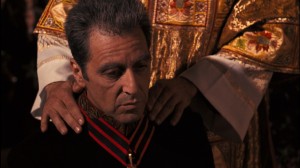The Godfather Part III
From the Chicago Reader (December 21, 1990). — J.R.
Francis Coppola’s tragic and worthy (if uneven) conclusion to his Godfather trilogy, which he wrote in collaboration with Mario Puzo, represents a certain moral improvement over its predecessors by refusing to celebrate and condemn violence and duplicity in the same breath, or at least to the same degree. For 161 minutes, Michael Corleone (Al Pacino at his best) seeks absolution for his past sins, and although a cardinal grants it at one point (in a powerful confession scene), the film itself refuses to. While some of the allegorical implications persist (crime equals capitalism, Mafia equals family, both equal America), the decline of America in a world market where both European money and the Vatican are made to seem as corrupt as the Corleones leads to an overall change of focus; it ultimately lands this film in a metaphysical realm where the very plot seems formalized into semiabstract rituals. The inflated sense of self-importance in part two — epitomized by the playing of Nino Rota’s ubiquitous waltz theme on a church organ during a communion — is somewhat muted here, although a virtuoso set-piece climax finally strains credulity when too many important events dovetail in a single sequence. Read more

